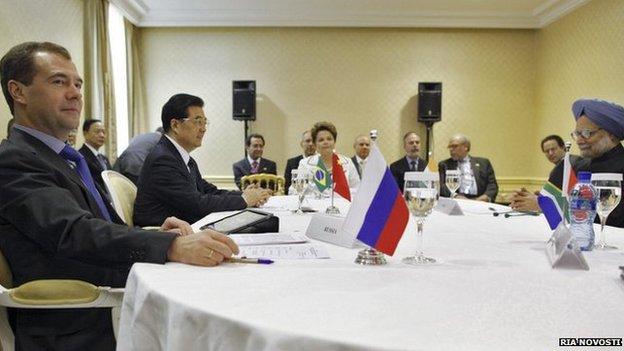Viewpoint: China and the BRICs - golden years ahead
- Published

The BRICS leaders: a new, rapidly growing force
It has been 10 years since the emergence of the concept of BRICs, a very short period of time compared to the whole of human history.
However, the world economy and politics have undergone a tremendous roller coaster ride during this time.
The old developed economies are now troubled by crises and are losing their spark. Meanwhile, BRIC nations are developing fast and making great contributions to the world's economy. As the new international order is forming, BRICs will become a significant emerging force to be reckoned with.
Combined fleet
From the beginning of the 21st century, the potential conflicts bubbling for many years have become more visible, and the crises besetting international economic and political situation are getting more serious.

Prof Yue Fubin: China's currency is appreciating too fast
Although no worldwide war has broken out, regional military conflicts have never stopped. Following the Asian financial storm, a global financial crisis was triggered by the US sub-prime turmoil. While people are still hoping the financial crisis would come to an end, the European debt crisis began to spread.
As the world was encountering political and economic difficulties, the emerging market countries of Brazil, India, Russia and China - with their special resources, population and market advantages - grasped the opportunity, and greatly enhanced their respective national powers.
The four BRIC countries were like a combined fleet sailing across the continents. After South Africa joined the group, BRICS further extended their influence.
China's 'solid development'
China needs to enhance its cooperation with the BRICS group, as much as the group needs China's participation.
The reform policy China has pursued in the past 30 years enabled the country to change beyond recognition - China in the 21st century is completely different from China over 30 years ago. In the past 10 years in particular, China has achieved what developed countries did in several decades or even centuries.
The gross domestic product of China's economy has increased from less than 10 trillion renminbi (RMB) to nearly 40tn RMB (£4tn; $6.3tn), rising from position 6 to number 2 in the world ranking. Its foreign trade has increased from less than $500bn to nearly $3,000bn, again putting the country second in the world.
What is more, China has transformed itself from a country which had to import capital, technology and know-how from abroad into a nation that exports capital and manufacturing, further strengthening the influence of the country on the international arena.
China's challenges
However, China also faces difficulties during its development: the appreciation of the Chinese currency, the renminbi, is too rapid, hurting our exports; the dependence on oil imports is too high, and the population too large.
There is the structural problem of finding the right people for the right jobs, and unemployment pressure is acute. High housing prices are compounded by high inflation, and the stock market is volatile. Environmental challenges are also serious.
We believe that China is able to solve these problems. We have special advantages, such as rich human resources of increasing quality, rare earths and other high-tech natural resources, and a huge internal consumer market.
Moreover, China has continued to pursue a foreign policy of mutual benefits, and maintained good economic and political cooperation with other countries, including developed countries, and, particularly, with China's neighbours. China's influence in the world is strengthening, and its role in the BRICS group is getting greater.
Bright BRICS prospects
Other BRICS nations are making fast progress as well. India's annual GDP growth is more than 6.5%. Russia is awakening after the "shock" period. Brazil's GDP is leading South America, and after South Africa joined the group, BRICS is now even more representative globally.
About 42% of the world's population, and 30% of the world's territories, are in BRICS countries. It is expected that by 2015, the GDP of BRICS will reach 22% of the global total.
With the development of their economic power, BRICS are destined to play an even greater role on the international stage.
The author is a professor of the Chinese Academy of Social Sciences, and the director of the China Institute for Coal Economic Research, Central University of Finance and Economics, China